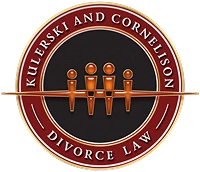If it is time to file for divorce in Illinois, you might like to know what your next steps look like. This is a big undertaking, but the process is governed by Illinois law and local court rules. Whether your divorce will be contested or uncontested, there are certain steps you must undertake. Luckily, you don’t have to take those steps alone.
At Kulerski & Cornelison, our team serves families in DuPage and Cook counties. We help you with your divorce from the very beginning to the end. Let us speak with you about your case and provide some personalized advice to help. We are highly experienced divorce attorneys that protect your rights and your future.
Step 1: Petition and Service
Your divorce will begin with the filing of the right paperwork. This involves filing a Petitioner for Dissolution of Marriage with the Circuit Court. A petition sets forth the grounds for your divorce and any issues to be resolved. This could include:
- Property division
- Separate property allegations
- Child custody issues
- Child support requests
A petitioner does not lay out every single argument or detail you need for the divorce. It puts the other party on notice of what you are alleging and what you desire.
Next, the petition has to get served on your spouse. This is usually done via personal service by a DuPage County Sheriff, or you might hire a private process server. Other methods of service might be appropriate as well, especially if you both consent to the divorce.
Step 2: Appearing in Court and Managing Your Case
Once the paperwork is served on your spouse, the court can get started. It will schedule an initial case management conference to learn more about the case. It may set deadlines for document exchange (discovery), alternative dispute resolution, and other important steps.
If you have kids together, both parents will have to go through a parenting education program. The court could also issue temporary orders that might cover:
- Parenting time
- Child support
- Spousal maintenance
- Who lives in the marital home
- Other temporary but important details
Step 3: Discovery and Financial Disclosures by Both Parties
Both parties are required to exchange financial information. This includes:
- Income statements
- Tax returns
- Bank account records
- Property valuations
- Debt disclosures
Each party must submit a Financial Affidavit. This is a sworn statement that outlines your income, expenses, liabilities, and assets.
Step 4: Mediation and Settlement Negotiations
DuPage County often utilizes mediation to help foster a settlement and resolve any disputes. In some situations, it may be mandatory for you, while in others it may be optional. Speak to your attorney about whether you must go through mediation.
Step 5: Litigation
If the parties were able to agree on everything, they can avoid litigation. If they can’t, the case will go to a trial in front of the judge. They have to make the decision on any matter you couldn’t agree upon. Litigation is more time-consuming and costly, but it might also be necessary. Consult with your attorney about how to proceed.
Step 6: Final Judgment of Dissolution
Once everything is concluded, either through agreement or a judicial decision, the court enters a Judgment of Dissolution of Marriage.
The judgment is binding and enforceable. If either party fails to comply, enforcement actions may be taken through the court.

What Might Happen After My Divorce is Final?
After the divorce is finalized, you may need to:
- Update legal documents (e.g., wills, powers of attorney)
- Change beneficiary designations
- Modify parenting plans or support orders if circumstances change
- Comply with any court-ordered obligations
- Pay child support
- File relocation motions if a parent moves
Get Ready to File Your Divorce with a Skilled DuPage County Divorce Lawyer
No matter your situation, divorce is never easy. There is an emotional toll and stress that comes with it. You can reduce much of that stress by hiring an attorney you can trust. Pick a team with years of dedicated experience in DuPage County you need to proceed with confidence.
At Kulerski & Cornelison, our family law attorneys are ready to help. Contact us today for a consultation of your case.

